25th Sunday in Ordinary Times,
Amos 8:4-7; Ps. 112: 1-2. 4-8; Tim. 2: 1-8; Gosp. of Luke 16: 1-13
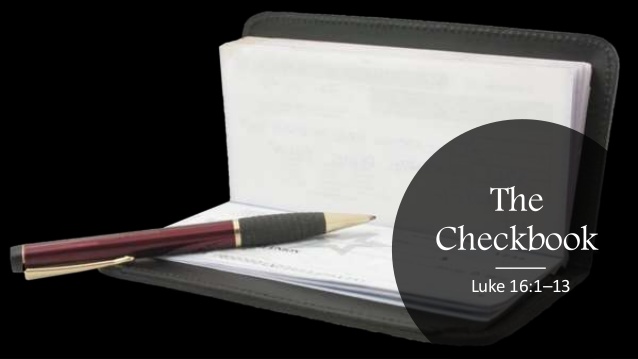
Preached by Msgr Philip Heng, SJ at Cathedral of Good Shepherd, Singapore on 22 september 2019
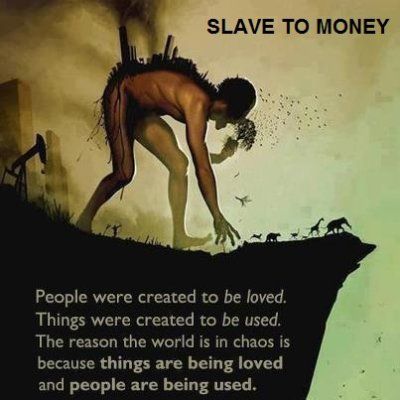 In today’s Gospel, Jesus touches on the very sensitive topic of money. When the Church or priest preaches and talks about money this sensitive topic is potentially open to much misunderstanding and negative feelings. In doing so, the Church can be seen as “money minded” and not focused on spiritual matters of growth in our relationship with God.
In today’s Gospel, Jesus touches on the very sensitive topic of money. When the Church or priest preaches and talks about money this sensitive topic is potentially open to much misunderstanding and negative feelings. In doing so, the Church can be seen as “money minded” and not focused on spiritual matters of growth in our relationship with God.
However, the truth of today’s Gospel cannot be ignored; both the reality of money and our spiritual life are inseparable. And as such, there is a need for us to have the great gift of discernment and commitment to the Gospel, to understand what Jesus is proclaiming today, which is, “You cannot be a slave of both God and of money.”
As such, as a proclaimer of God’s Word, I cannot simply divert the theme of what Jesus proclaims, to another topic that is more acceptable and less contentious and less challenging. As a preacher, my obligation is to proclaim God’s Word as objectively and as prophetically as I can in the challenges, without condemning any persons.
Let us first note that this story of the “shrewd steward” that Jesus praises in the Gospel, can be confusing if we do not understand its background and meaning. This is because on the surface of the episode, Jesus can be very easily misunderstood as praising a dishonest steward.
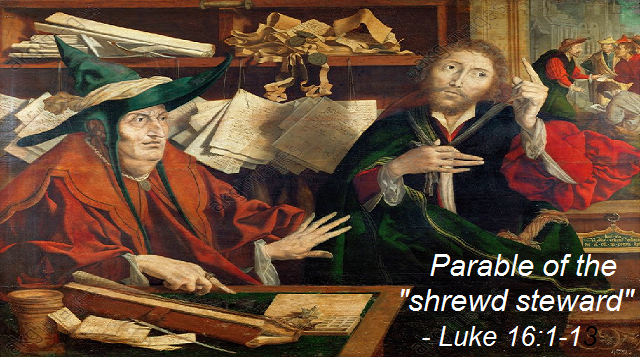 First, we hear Jesus telling His disciples that this steward was being denounced for being wasteful or for mismanaging the wealthy owner’s property. Having heard of this, the owner terminates the employment of the steward. As the steward then faces the reality and tells himself, “What am I to do? Dig? I am not strong enough. Go begging? I should be too ashamed.”
First, we hear Jesus telling His disciples that this steward was being denounced for being wasteful or for mismanaging the wealthy owner’s property. Having heard of this, the owner terminates the employment of the steward. As the steward then faces the reality and tells himself, “What am I to do? Dig? I am not strong enough. Go begging? I should be too ashamed.”
The steward then comes up with a plan to protect himself and provide for his future. He calls all the debtors and one by one, he reduces what is being owed; some he gives 50% reduction, others 20% reduction in the debt. In this strategy, he hopes that as he has lost his job, these debtors whose debt have been reduced will be grateful to him and will treat him well and even welcome him into their homes.
The background to this episode is that in the Palestine society, the owner of the property who rents out his property is legally entitled to payment of rental from his tenant. In addition to the rental, the steward who is the agent managing the property is also legally entitled to some commission for his services. It is this commission that the shrewd steward forgoes, instead of his owner’s rental. As such, the steward’s shrewd actions are legal and acceptable. Understood in this context, Jesus praises the “steward” for his shrewdness, and did not condemn him for any dishonesty. In fact, the Gospel tells us, that in praising the “shrewd” steward Jesus tells His disciples, “Use money, tainted as it is, to win you friends, and thus make sure that when it fails you, they will welcome you into the tents of eternity.”
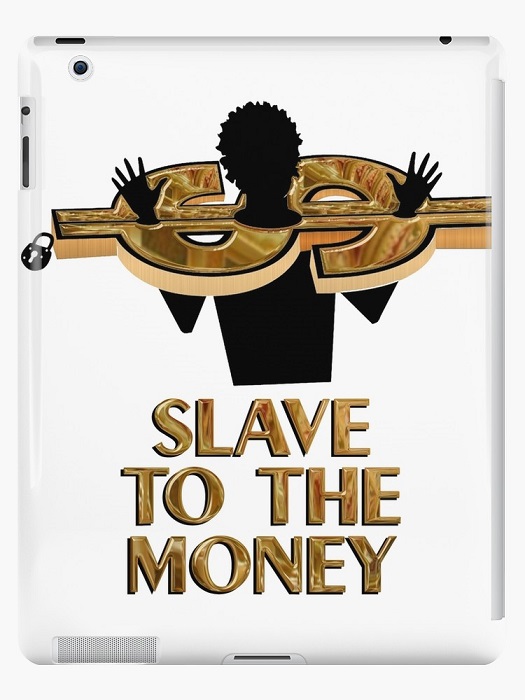 In other words, my brothers and sisters in Christ, Jesus is advising His disciples and all His followers like us, that while money is a good thing to have, we should remember to use it well for the needs of others and more importantly to help us gain Eternal Life. However, added to this advice, Jesus also cautioned His disciples and us when He says, “You cannot be a slave of two masters; of both God and of money.” By this Jesus means that it is not wrong and not an evil to have money and material possessions. However, to be a “slave” of them is to ignore the greater and more important needs of life, and fall into the temptation of being obsessed and possessed by the lures of money and riches.
In other words, my brothers and sisters in Christ, Jesus is advising His disciples and all His followers like us, that while money is a good thing to have, we should remember to use it well for the needs of others and more importantly to help us gain Eternal Life. However, added to this advice, Jesus also cautioned His disciples and us when He says, “You cannot be a slave of two masters; of both God and of money.” By this Jesus means that it is not wrong and not an evil to have money and material possessions. However, to be a “slave” of them is to ignore the greater and more important needs of life, and fall into the temptation of being obsessed and possessed by the lures of money and riches.
There is a story of two brothers David and Shaun, and their families. When their parents died, both families who had an equal share of the property, decided to move from the crowded city to live in the beauty and peace of nature on an island, where they have each bought a big and beautiful house. David and his family gave away much of their furniture and belongings to the poor, and only took the bare essentials of what they needed. However, Shaun and his family insisted on taking everything to their new home.
As they were crossing to their island, a heavy storm broke out and their lives were being threatened. David and his family knew that if they did not throw their furniture and belongings into the sea, so that their boat would be lighter, they may be swallowed-up by the huge waves. So, they threw many of their belongings into the sea.
Shaun and his family on the other hand, in spite of the dangers they were facing, clung tightly on to all their possessions and could not throw anything overboard. Their possessions were too precious to them. In the end, with the constant huge waves crushing on to their boat, they could not survive and they eventually drowned. David and his family on the other hand was able to make it on shore.
My sisters and brothers in Christ, it is clear that Shaun and his family were foolish in clinging on to their material wealth and eventually lost everything, including their lives. However, the truth of this story applies to many of us, and sadly we may not even be aware of such materialistic attachments in our lives. In its saddest form, we read of reports of families suing each other in public for a share of their wealth; and even more tragically when their parents are still alive. In this context, we understand why Jesus reminds us today, “You cannot be a slave of both God and money. . . and asserts strongly that, “you will either hate the first, and love the second, or treat the first with respect and the second with scorn.”
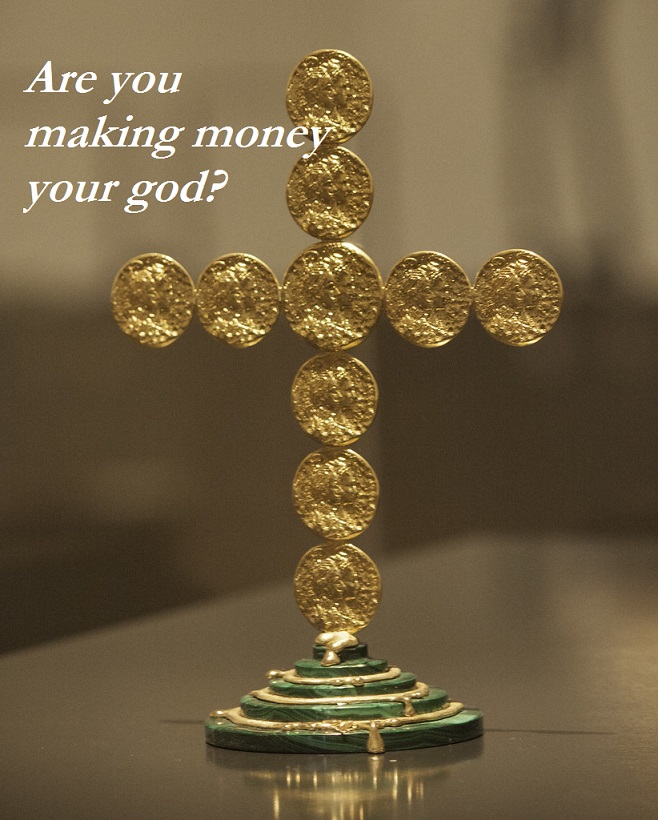 And, the reason why many of us are more attracted and attached to our monies and material possessions, than to God is not so much that we are bad or do not love God. But, more so because we have been too caught up in a secular lifestyle that have falsely influenced us into thinking that material wealth will give us the security and peace, and the fulfilment and unity that we long to have in our hearts and homes. And for those of us who are unfortunately deeply entrenched into such a life-style or dreaming of such a lifestyle, we know in our hearts of hearts that, such secular possessions do NOT and CANNOT produce and genuine peace, unity, and fulfilment in our hearts and homes.
And, the reason why many of us are more attracted and attached to our monies and material possessions, than to God is not so much that we are bad or do not love God. But, more so because we have been too caught up in a secular lifestyle that have falsely influenced us into thinking that material wealth will give us the security and peace, and the fulfilment and unity that we long to have in our hearts and homes. And for those of us who are unfortunately deeply entrenched into such a life-style or dreaming of such a lifestyle, we know in our hearts of hearts that, such secular possessions do NOT and CANNOT produce and genuine peace, unity, and fulfilment in our hearts and homes.
My brothers and sisters in Christ, this is precisely why Shaun and his family in our story, drowned. They were too attached to their false securities of their material possessions. David and his family on the contrary were free of such distorted and empty fantasies, and had the wisdom to be detached from their material wealth, and were able to build their lives on the genuine love for their family and on the Truth of Jesus’ Gospel, which offers them the true securities of this life and eternal happiness after this life.
There is a story of poor man who was sentenced to death by his king, for stealing. On his way to the gallows, to be hanged, he told the governor, that he had a great secret that he would wish to tell the king, and it would be such a pity if he were to die with the great secret. He said he would put a seed of a pomegranate in the ground, and through the secret that his father had taught him, the pomegranate will grow into a tree and bear fruit overnight; and when the fruit is harvested, the king would discover the great secret.
When the thief was brought before the king, who was very keen to learn of the great secret, the thief said, “Your majesty, where do you wish that this tree be planted? The king pointed out a spot in his vast compound of his palace to him. The thief then dug a small hole in the ground and then, held up a seed of the pomegranate and said, “Your majesty, this seed must be put into the ground by someone who has not stolen or taken anything that did not belong to him. But, since I had stolen some bread to feed my starving family, I cannot put the seed in the hole.
And so, your majesty, could you appoint someone in your vast kingdom to plant this seed?” The king then asked one official after another and no one could be found; and no one dared to plant the seed. The thief then asked, “Your majesty, perhaps you are worthy of planting the seed yourself?” The king pondered for a while and realised that he too did not qualify and could not plant the seed. For the first time and to his horror, the king realised the injustice of condemning this poor thief to death; and more so for feeding his hungry family, when in truth, he and his whole kingdom are a thousand times more guilty of such a punishment. He then pardoned the thief and through this lesson, he ruled his kingdom with greater justice, compassion and wisdom.
My brothers and sisters in Christ, in many ways we can be like the king in our story who was unaware and who did not feel guilty of his unjust and uncompassionate ways of ruling his kingdom, until the poor man who was condemned to death pointed it out to him. Like him, we too can very easily fall into the temptation of justifying and telling ourselves that we are not guilty of the sin that Jesus proclaims, when He said, “You cannot serve both God and money”.
Let us ponder for a moment, “Is it really true that we are not guilty of what Jesus proclaims today”? If so, do we not find ourselves getting upset with people, and fussing and fretting over our preferences for certain food, fashion, and other materialistic things, because they affect our egos, our vanity and our reputation? And so, it may do us a lot of good to ponder and search our consciences and ask Jesus, when we pray tonight, “Lord, open my eyes to the many areas of attachments I may have in my life, so that I can live a freer life that is more fully attached to You as our Lord and Saviour.”
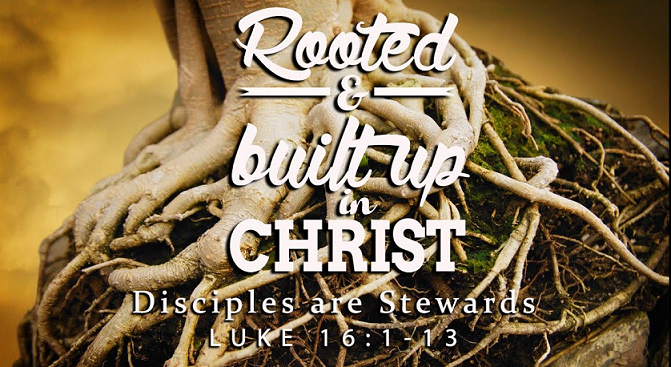 And so, my sisters and brothers in Christ, as I conclude, let us then remind ourselves that the attachment to “money” that Jesus is referring to is not only literal, but also symbolic of the other attachments and hindrances that may be preventing us from living our lives as wholeheartedly as God Wills of us. And if this is so then, NO person is exempted from Jesus’ challenge in today’s Gospel.
And so, my sisters and brothers in Christ, as I conclude, let us then remind ourselves that the attachment to “money” that Jesus is referring to is not only literal, but also symbolic of the other attachments and hindrances that may be preventing us from living our lives as wholeheartedly as God Wills of us. And if this is so then, NO person is exempted from Jesus’ challenge in today’s Gospel.
In other words, whether we are economically rich or poor, or whether we are a laity or priest or religious we can ALL like Shaun and his family in our story, easily allow our attachments to weaken our relationship with Jesus, through becoming “a slave” to the many different material things, possessions, people, addictions, vices like pride, sloth, and the like in our lives.
And if this so, then Jesus is challenging you and I today, to beg God for the graces and strength we need to be freed from such attachments and hindrances in our lives, before we become “a slave” to them and allow them to become the “god” of our lives, instead of Jesus as our True God and Saviour of our lives. And should this happen, we would sadly have lost the true purpose and meaning of our lives on earth, and even more tragically, risk losing the gift of Eternal Happiness that God our Loving and Merciful Father wants to give us.
Adapted from: The New Interpreter’s Bible, Vol. IX, Luke, John; Abingdon Press: Nashville; 1995; p.310.
Adapted from: Hearts Burning; Homilies for the Sundays of the Year (Cycle A,B,C0; Nil Guillemette, SJ; St Pauls,Pub.; 2006; p. 417.
Msgr Philip Heng, S.J.
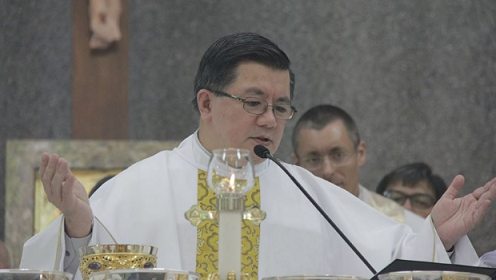
besucherzaehler.co from 26th September 2019
